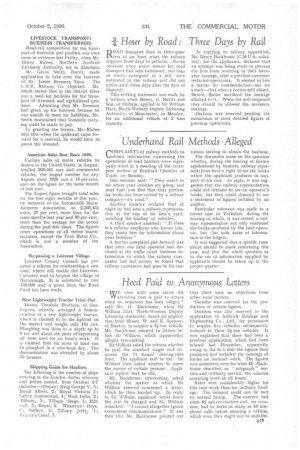Heed Paid to Anonymous Letters
Page 27

If you've noticed an error in this article please click here to report it so we can fix it.
" WM view with some alarm the
VV attention that is paid to letters when no objection has been lodged," said Mr. 1-1. Backhouse, when Sir William Hart, North-Western Deputy Licensing Authority, heard an application from Messrs. W. and E. Spencer, of Buxton, to acquire a 2i-ton vehicle. Mr. Backhouse referred to letters before Sir William, which (apparently) alleged rate-cutting.
Sir William asked the witness whether be paid the standard wages and observed the 11 hours' driving-time limit. The applicant said he did. Sir William then asked whether he knew the names of certain persons. Applicant replied that he did.
Mr. Backhouse, intervening, asked whether the matter to which Sir William referred concerned a letter, which he then handed up. In reply to Sir William, applicant wrote down the rate he charged and Sir William remarked: " I cannot altogether ignore anonymous communications." It was then that Mr. Backhouse pointed out that there were no objections from other local carriers.
Decision was reserved for the production of certain figures.
Decision was also reserved in the application of Ardwick Haulage and Engineering Co., Ltd., for permission to acquire five vehicles, subsequently reduced to three 2i-ton vehicles. It was explained that there had been a previous application, which had been refused last November, apparently owing to the fat that the figures then' produced had included the earnings of lorries on contract work. The figures now submitted were for what Mr. Backhouse described as " telegraph " service and ordinary service, the concern accepting work at all hours.
Rates were considerably higher for this rush work than for ordinary haulage. The demand could not be met by normal hiring. The concern had some 85 sub-contractors and, on occasion, had to make as many as 40 telephone calls before securing a vehicle, which even then might not be suitable,




















































































